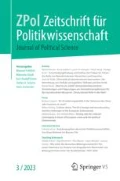Abstract
The article examines to what extent Giorgio Agamben’s idea of a permanent state of emergency can be found in German refugee camps. Therefore, first results from empirical research in the emergency shelter at Tempelhof Airport Berlin will be presented. In the empirical research, the author follows the three levels of regulation, conflict resolution and legal integration to shed legal light on the emergency accommodation at Berlin Tempelhof Airport. For this purpose, guideline-based interviews were conducted with various actors, the analysis of which is illustrated in the article. The author arrives at the thesis that the (permanent) exception to the law does not put the inhabitants of the emergency accommodation in a situation in which law is difficult to mobilise. Rather, it is the legal regulations themselves that make access to the juridical system more difficult.
Zusammenfassung
Der Artikel geht der Frage nach, inwiefern sich die Idee des permanenten Ausnahmezustands von Giorgio Agamben in deutschen Flüchtlingslagern wiederfindet. Dabei werden erste Forschungsergebnisse aus der empirischen Forschung in der Notunterkunft im Flughafen Tempelhof Berlin vorgestellt. Die Verfasserin folgt dabei den drei Ebenen der Regulation, Konfliktlösung und rechtlichen Integration, um die Notunterkunft im Flughafen Tempelhof rechtlich zu beleuchten. Hierzu wurden leitfadengestützte Interviews mit unterschiedlichen Akteuren durchgeführt, deren Analyse im Artikel präsentiert wird. Die Verfasserin gelangt dabei zu der These, dass nicht die (permanente) Ausnahme vom Recht die Bewohnerinnen und Bewohner der Notunterkunft in eine Situation bringt, in der Recht nur schwer mobilisierbar ist. Vielmehr sind es die rechtlichen Regelungen selbst, die den Zugang zum Recht erschweren.
Similar content being viewed by others
Notes
The critical German Law Journal Kritische Justiz published an edition about the exceptional state (Buckel et al. 2017) just shortly after the conservative Constitutional Law scholars Otto Depenheuer and Christoph Grabenwarter published the book the state in the refugee crisis. In its foreword, they argue that Germany has experienced a state of exception due to the chaotic migration to Germany in late 2015 (Depenheuer and Grabenwarter 2016, p. 7).
About the idea of a general absence of law in a state of exception, see Anna-Bettina Kaisers contribution in this journal.
Whether the “Notstandsverfassung” can be seen as the German Constitutional state of exception or rather a set of emergency measures is currently discussed: Whereas Kersten argues that the German Constitution doesn’t know a state of exception (Kersten 2016, p. 202), Kaiser disagrees with this idea (Kaiser 2017a, p. 203).
The German Asylum Law merely names the two different types of refugee accommodation Initial Reception Centres (“Aufnahmeeinrichtungen”, § 47 Asylgesetz) and Shared Accommodation Housing (“Gemeinschaftsunterkünfte”, § 53 Asylgesetz) without giving further notice about their quality standards. Emergency shelters are legally seen as a sub category of the Initial Reception Centres.
Berlin State Office for Refugee Affairs, contract appendix 1: Specification of quality standards and services (December 2016), p. 7 ff.
§ 14 BauO Bln (fire precaution measures), § 51 BauO Bln (accessibility measures) as examples from Building Law for the use of historical buildings.
In 2012, the German Federal Constitutional Court has announced, that asylum seekers are entitled to amount of social welfare, that secure an humane living conditions (BVerfGE 132, 134, Rn. 159 ff). An elaboration of quality standards under constitutional and human rights law will be found in my doctoral thesis “German Refugee shelters as the sight of the permanent state of exception? A legal sociological analysis” (working title).
The quotes are excerpts of interviews I have conducted for my PhD research project. The interviews were held in German and English. I have translated them personally and at times have modified them grammatically for reasons of standardization and anonymization. Thank you, Raphaël Bouteau, for the inspiring talk about interview conduction and ‘othering’ within the research process.
See Fn. 2.
BT-Drs. 18/6185, p. 1 f.
References
Agamben, Giorgio. 2002. Homo sacer: Die souveräne Macht und das nackte Leben. Frankfurt am Main: Suhrkamp.
Agamben, Giorgio. 2004. Ausnahmezustand. Frankfurt am Main. Frankfurt am Main: Suhrkamp.
Baer, Susanne. 2006. Der Bürger im Verwaltungsrecht. Tübingen: Mohr Siebeck.
Baer, Susanne. 2014. Rechtssoziologie. Baden-Baden. Baden-Baden: Nomos.
Behrman, Simon. 2014. Legal Subjectivity and the Refugee. International Journal of Refugee Law 26:1–21.
Beitzer, Hannah. 2017. Warum Deutschlands größte Flüchtlingsunterkunft so umstritten ist. Süddeutsche Zeitung. http://www.sueddeutsche.de/politik/tempelhofer-feld-warum-deutschlands-groesste-fluechtlingsunterkunft-so-umstritten-ist-1.2839170. Accessed: 30 Nov 2017. ISSN: 0174-4917
Blankenburg, Erhard. 1995. Mobilisierung des Rechts. Berlin: Springer.
Buckel, Sonja, and Jens Wissel. 2010. State Project Europe: The Transformation of the European Border Regime and the Production of Bare Life. International Political Sociology 4:33–49.
Buckel, Sonja, et al, 2017. Ausnahmestaat. Kritische. Justiz 50:3–80.
Depenheuer, Otto, and Frank Grabenwarter. 2016. Der Staat in der Flüchtlingskrise: zwischen gutem Willen und geltendem Recht. Paderborn: Ferdinand Schöningh.
Frankenberg, Günther. 2010. Staatstechnik:Perspektiven auf Rechtsstaat und Ausnahmezustand. Frankfurt am Main: Suhrkamp.
Kaiser, Anna-Bettina. 2017a. Ausnahmezustand. Ad. Legendum 3:200–207.
Kaiser, Anna-Bettina. 2017b. b. Ausnahmeverfassungsrecht. manuscript.
Kersten, Jens. 2016. Ausnahmezustand? Juristische Schulung 56:193–202.
Owens, Patricia. 2009. Reclaiming ‘Bare Life’? Against Agamben on Refugees. International Relations 23:567–582.
Raiser, Thomas. 2013. Grundlagen der Rechtssoziologie. Tübingen: Mohr Siebeck.
Schmitt, Carl. 2014. Dictatorship. Cambridge: Polity Press.
Schmitt, Carl. 2015. Politische Theologie. Berlin: Duncker&Humboldt.
Turner, Simon. 2016. What Is a Refugee Camp? Explorations of the Limits and Effects of the Camp. Journal of Refugee Studies 29:139–148.
Wessel, Julia Schulze. 2014. Vom Lager zur Grenze: Giorgio Agamben über Ausnahmeräume und Flüchtlinge. In Migration, Asyl und (Post‑) Migrantische Lebenswelten in Deutschland: Bestandsaufnahme und Perspektiven migrationspolitischer Praktiken, ed. Miriam Aced et al, 11–28. Berlin and others: Lit Verlag.
Wright, Susan, and Sue Reinhold. 2011. Studying Through: A Strategy for studying Political Transformation. Or Sex, Lies and British Politics. In Policy Worlds, ed. Cris Shore, Susan Wright, and Davide Però, 86–105. New York: Berghahn Books.
Author information
Authors and Affiliations
Corresponding author
Rights and permissions
About this article
Cite this article
Engler, AM. Shifting the question to law itself: Agamben’s permanent state of exception and German refugee camps in empirical research. Z Politikwiss 28, 485–494 (2018). https://doi.org/10.1007/s41358-018-0146-z
Published:
Issue Date:
DOI: https://doi.org/10.1007/s41358-018-0146-z


